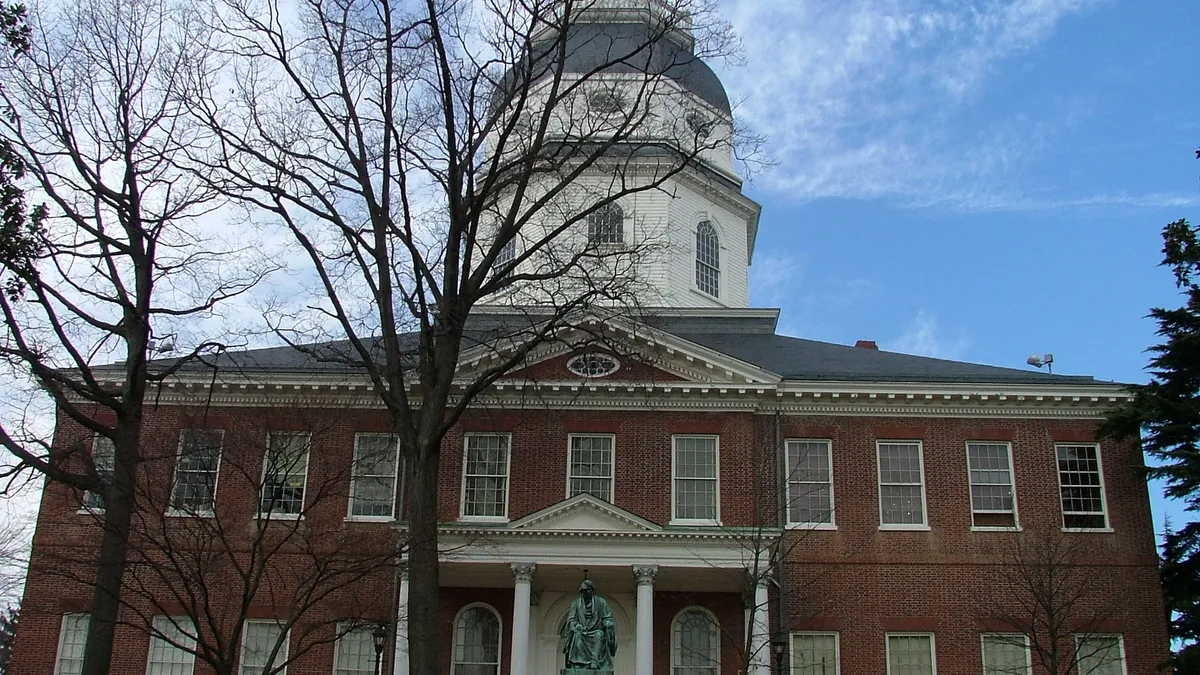Dive Brief:
- Maryland lawmakers were moving forward on legislation to boost low-income energy efficiency efforts before the spread of COVID-19 forced the state's General Assembly to shut down Wednesday.
- Bills in the Maryland House and Senate aimed to amend the law underpinning the state's energy efficiency resource standard, to set an annual incremental gross energy savings target for low-income customers of at least 1% starting in 2021.
- Advocates are disappointed to see the measure stall with widespread support, but are hopeful it can be resurrected either in a special spring legislative session, in next year's session, or by having the Maryland Public Service Commission take it up.
Dive Insight:
The EmPOWER Maryland Energy Efficiency Act was enacted in 2008, and requires 2% annual energy savings. While it has been successful in reducing the state's energy usage, lawmakers say it has left behind underserved communities.
Maryland's approach "is considered a national model," Del. Lorig Charkoudian, D, said at a Feb. 27 hearing on the proposal held by the Economic Matters Committee. "Where we have failed miserably is in the equitable distribution of energy efficiency resources."
"Lower income people in this state have not received the same benefits in terms of energy efficiency as higher income people have," Charkoudian said. "It's a really significant energy justice issue. ... Because a lot of the housing stock low-income people are living in is in such bad shape, it costs more to weatherize those homes."
The difficulties in getting energy efficiency assistance to low-income households is not limited to Maryland. And as there is greater recognition of the problem, experts say more states are taking action.
Barriers include low-income housing stock lacking health and safety upgrades that make energy retrofits more difficult or expensive. And multi-family building owners often face a multitude of issues, meaning efficiency is often pushed to the back of the line.
The issue is not particular to Maryland, said Natural Resource Defense Council’s Deron Lovaas, co-director of the national Energy Efficiency for All partnership.
"This is a trend we see in states across the country — increased investment in the low-income sector — though it still lags behind," Lovaas told Utility Dive. He called the legislation "a no-brainer."
"These savings targets have worked across the whole portfolio," said Lovaas. "But [low income] is the toughest section in terms of barriers to energy efficiency."
Maryland is one of more than two dozen states with an energy efficiency resource standard that delivers services to residents or businesses through a portfolio of programs run by electric utilities or state agencies. And a growing number have, or are considering, low-income carve-outs.
In the District of Columbia, the Public Service Commission is working on targets similar to the Maryland 1% target, said Lovaas. Likewise, regulators in Pennsylvania have issued a draft order raising energy efficiency targets for low-income customers. Connecticut and Massachusetts have spending targets for low-income efficiency investment.
"This is the next generation of low-income energy efficiency policy," Lovaas said. "An increasing number of states are doing this well. Just in the past five years there has been a lot of learning and improvements."
The problem is also being addressed beyond state legislatures.
In Michigan, DTE Energy is testing an energy efficiency and bill assistance program that will help maintain service to customers who are behind on their bills, while also offering energy-efficient appliances and weatherization help to reduce future electricity bills.
And on Wednesday, the Missouri Public Service Commission issued an order to keep Ameren's fixed rates flat and increase funding for low-income assistance programs. The decision adds $700,000 for a low-income assistance program, which will increase from $1.3 to $2 million. And, Ameren will donate $7 million to more than a dozen consumer action agencies that administer low-income weatherization assistance programs.
Sierra Club helped negotiate the agreement with Ameren, along with other intervenors in the case.
“Helping our most vulnerable neighbors pay for basic needs, like electricity, is critically important," Leah Clyburn, organizer for Sierra Club’s Beyond Coal Campaign, said in a statement. "During a time of so much health and economic uncertainty for families across Missouri, keeping fixed charges flat and increasing funding for the low-income assistance program is as important as ever.”
Clarification: A previous version of this article misidentified Deron Lovaas' position with the Energy Efficiency for All partnership. He is co-director.
Correction: A previous version of this story misidentified the Maryland lawmaker speaking in favor of legislation to boost low-income energy efficiency efforts during a Feb. 27 hearing by the Economic Matters Committee. That lawmaker was Del. Lorig Charkoudian, D.














